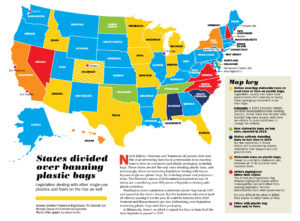The packaging industry and current environmental laws and regulations
We at EPE USA continue to implement sustainable designs and processes in our efforts to save the world, one package at a time. We wanted to explore recent environmental legislation within the packaging industry. Where are we with current environmental laws and industry standards for packaging in the U.S.?
The primary targets for sustainable policy thus far have been plastic bags and polystyrene (EPS) containers, both of which take centuries to degrade and have a widespread negative effect on our nation’s natural ecosystems. Hawaii and California led the charge with statewide bag bans in 2015 and 2016 respectively. Since then, New York, Oklahoma, Tennessee, North Dakota, and Maine passed legislation prohibiting plastic bags – a remarkable step towards a more sustainable future for packaging. However, in direct contrast, a number of states have also enacted laws preventing local governments from approving such legislation. Two steps forward, one step backward.
This May, Maine banned polystyrene food containers from restaurants and grocery stores, marking a huge turning point in the packaging world as the first state to institute a ban on foam. Following suit, Maryland’s legislature has also passed a similar bill for the governor to sign intended to eliminate polystyrene from food and beverage packaging. Connecticut is currently debating a ban on polystyrene containers in addition to plastic bags. Earlier this year, New York City joined San Diego, Seattle and Washington DC with an enforced ban on single-use polystyrene cups, plates, bowls, and ‘packing peanuts.’
These recent regulations clearly indicate a growing trend in state and local governments of banning specific products and materials which have been outed as being difficult to recycle and damaging to the environment. These substances are quickly labeled as unsustainable and become the subject for debate, driven by consumer sentiment and conservation efforts. The new trigger word in food and beverage packaging is polystyrene, which makes up a significant percentage of e-commerce packaging materials. In fact, in the private sector, Target has already agreed to a plan to gradually phase-out the usage of polystyrene packaging in its e-commerce shipping. Environmental group As You Sow has lobbied Amazon as well to work towards removing EPS foam from their supply chain.
Amazon is launching its own initiative focused in part on establishing regulations for packaging sustainability. One of the core elements of the Frustration-Free Packaging (FFP) program is reducing packaging waste and enforcing recyclability requirements. Amazon represents a huge percentage of the e-commerce packaging industry and starting August 1st, 2019 will be leveraging its power to force its vendor’s and their packaging companies to comply with new environmental standards.

Even with new legislation and with companies enacting their own environmental regulations, our society is not yet close to solving the multitude of challenges posed by climate change and the current packaging industry methods. However, these newly instituted bans and greater awareness of the dangers of plastic and polystyrene packaging mark a promising trend. More and more states and localities are focusing on sustainable packaging and companies like Amazon and Target are helping pave the way for more environmentally sound practices. And as consumer demand for sustainable solutions begins to transition into state regulations on packaging, we will continue to see companies shift their processes and begin to utilize different, more environmentally conscious materials. Even though the packaging industry and current environmental laws and regulations are a bit complex we here at EPE USA are proud to represent packaging design innovations inspired by our mission to save the world, one package at a time.




Leave a Reply